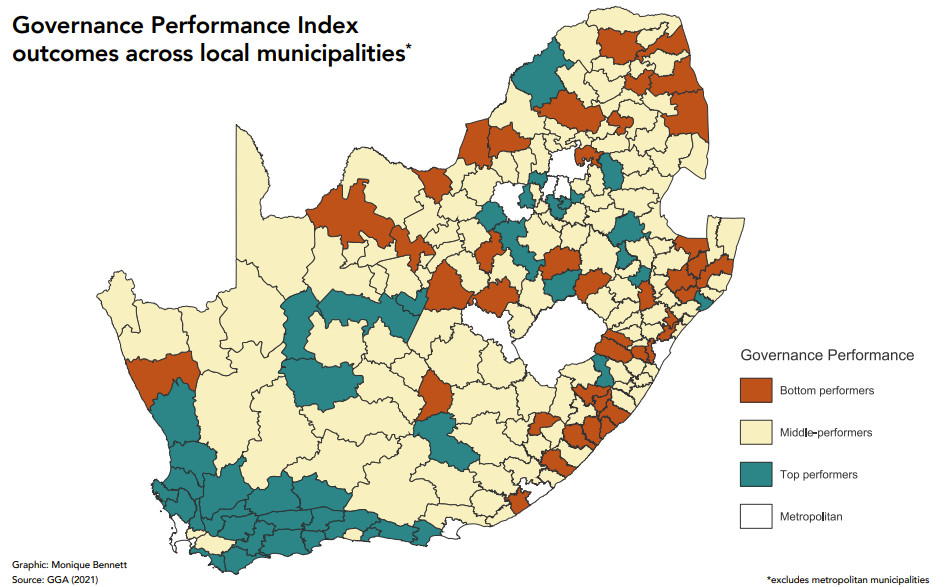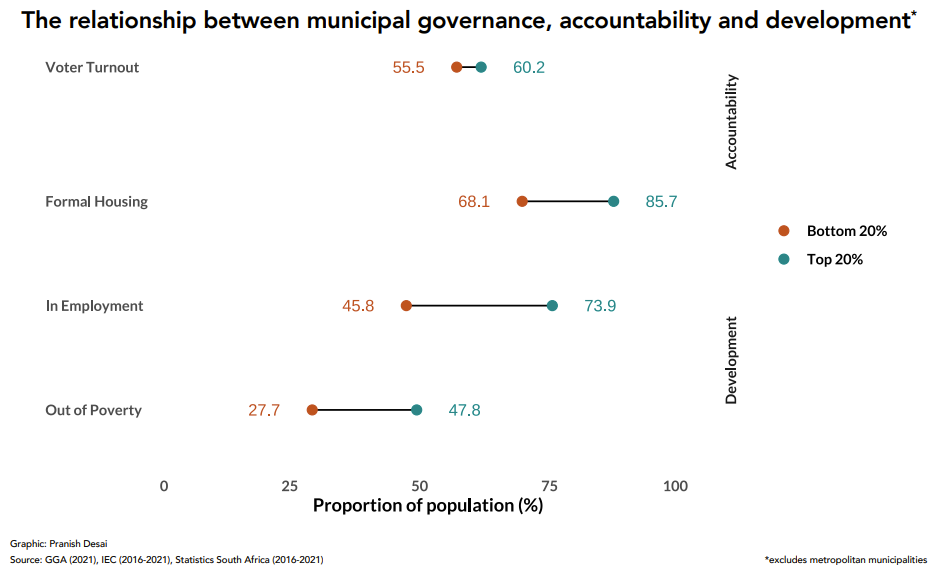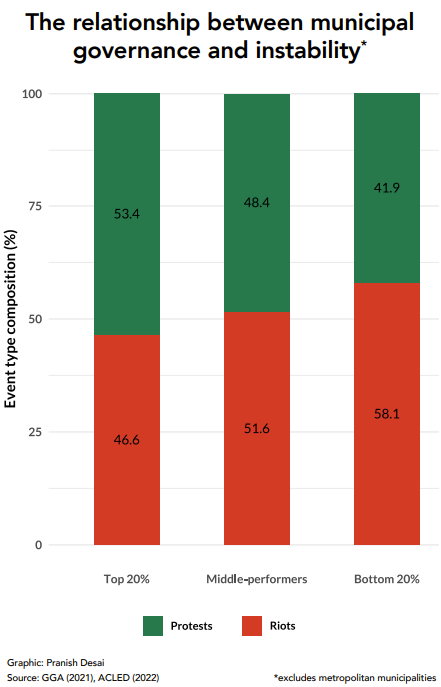At the forefront of debates about the functioning of local government in South Africa is a question of stability. This discourse is understandably dominated by the attention given to political aspects of instability in metropolitan councils. These emphasise the role that weak coalitions have had in plaguing service delivery provision and clean financial administration.

A protester reacts as community members from Reigers Park protest outside the municipal offices over service delivery and housing issues on 9 March 2017, in Boksburg. PHOTO: AFP/JOHN WESSELS
However, it is equally vital that we study the problem from a governance perspective by examining the role that inadequate local governance has had in aggravating instability outside of major cities. In this vein, Good Governance Africa has produced a new intelligence report which encourages the private sector to play a greater role in improving local government capacity in South Africa.
The publication considers the links between governance quality, democratic accountability, economic development and instability at the level of South Africa’s 205 local municipalities. Such an analysis is more important than ever in the aftermath of last July’s social unrest which cost the economy billions of rand and saw hundreds of businesses permanently shutter.
The intelligence report makes use of our 2021 Governance Performance Index which scores and ranks local municipalities according to their constitutional mandate. The index incorporates three aspects of governance: administration, planning and monitoring, and service delivery provision. The latter is weighted most heavily because service delivery is ultimately the core business of local government.

Generally, local governments display some proficiency in planning, but less adeptness at implementation, especially when distributing basic services like water, electricity and sanitation. However, it is in administration, particularly financial administration, where the struggle of municipal offices across the country is most evident. This is largely a consequence of localised corruption and a lack of technical skills in financial reporting within municipal offices.
As the intelligence report demonstrates, the benefits of effective local governance are clear. Enhanced democratic accountability, higher levels of economic development and a greater likelihood of security are all present in better-managed municipalities.
Better performing municipalities consistently reported higher voter turnout across the 2016, 2019 and 2021 local and national elections. Moreover, in each of the nine provinces, top-ranked municipalities record less unemployment and lower poverty levels with more residents staying in formal housing.

We are not suggesting a line of causality from governance performance to improved development outcomes. Still, the correlation alone raises obvious implications for where resources should be allocated to deliver broad-based growth.
The disparities between better-run and worse-run municipalities are also starkly reflected in measures of stability. We merged our own index with protest and riot data collected by the Armed Conflict Location & Event Data Project (ACLED) to assess whether there is a strong relationship between governance and stability. The data encompassed the period from January 2017 to December 2021.
In a democratic society, the distinction between protests and riots matters: Peaceful protests form a critical part of citizen accountability, drawing the attention of those who govern vital issues. By contrast, riots disregard the rule of law. Regrettably, the loss of life and livelihoods is a frequent consequence of rioting.
While there are undeniable links between higher population densities and greater numbers of protests and riots, we also found the efficacy of local government to be a key determinant regarding whether a municipality was more likely to experience a protest than a riot.
Crucially, the top 20% of local municipalities are more likely to experience protests than riots. The same cannot be said for the bottom 20%, where riots far outnumbered protests across the five-year period. This demonstrates that the risk of violent upheavals rises the more deficient governance in a municipality is.

Businesses are a frequent target of rioting. Along with local communities, they are the groups with the strongest interest in maintaining stability at the municipal level. This applies to both the immediate problem of instability as well as the need to create a society wherein socially responsible investments can flourish in the longer term.
Ensuring capable municipal governance is a necessary step toward realising this goal and private sector interests have a role to play. We argue that the focus should be on helping enhance municipal capacity in financial administration, following basic good governance principles outlined in King IV, and delivering effective services.
Businesses which help to build institutional capacity should not replace local government or do its job for them, but they can add value by fulfilling a supporting role. One mechanism through which greater private sector involvement in local governance can materialise is through public-private partnerships.
According to a 2020 report by the South African Local Government Association, there were only 14 registered public-private partnerships between local municipalities and the private sector. In our intelligence report, we draw attention to the unwieldy nature of the current registration process in the context of our case study on the Greater Kokstad local municipality in KwaZulu-Natal. Predominantly agrarian, the municipality was the top-ranked KZN local municipality in our 2021 GPI, scoring 9th best overall (out of 205).
Given that it is located in a province which, historically, is an epicentre of disruptive action in the country, Greater Kokstad is also notable for having experienced no protests and no riots between 2017 and 2021. Strong leadership from local officials is a key reason behind why the municipality maintains high standards across planning, administration and service delivery provision.
A common theme in the municipality’s most recent Integrated Development Plan is that it desires assistance and cooperation from private partners on several key projects including renewable energy expansion and attracting greater investment in existing businesses. However, in the present system, such initiatives are difficult to realise for most local municipalities due to the slow and costly registration process.
In this regard, South Africa’s local government system can benefit by learning from the way some other African countries deal with these partnerships. An example of this is the Zambian mining town of Kalumbila.
By designating the area as a special economic zone, the Zambian government has helped to create an attractive business environment. The town and its residents also gain by having access to a healthy job market, better access to skills and financing and a stable community to live in.
How might South Africa replicate similar initiatives? Our intelligence report contains several recommendations that can benefit municipalities, businesses and communities at large.
A natural first step is for parliament and the Department of Co-operative Governance and Traditional Affairs to review existing local government legislation. This ought to happen with an eye to enabling responsible private sector interests to adopt a more collaborative approach to dealing with local authorities.
This would not only enable local business interests to partake in formal partnerships more easily with municipalities in which they operate, but it would also open the door to other critical forms of cooperation.
For instance, they can help build administrative and financial capacity at the municipal level by sponsoring governance training for municipal staff with an emphasis on industry standards in financial reporting and infrastructure management.
To help address the high levels of youth unemployment, businesses can also explicitly budget for internships and apprenticeships. Municipalities can then use their communication departments to inform and encourage young people to apply for these opportunities.
Local businesses are also ideally placed to sponsor community policing forums designed to improve relations between local law enforcement officials and the communities they serve.
To be sure, greater cooperation between the private sector and governmental structures is not a panacea. Indeed, the national experience with state capture represents a visceral warning about what happens when mal-intentioned private actors meet corrupt governmental officials.
So, the process of reviewing how public-private partnerships function at the local level should be accompanied by a thorough revision of ethical standards. However, we do believe that there is room for greater cooperation between municipalities and responsible businesses for the potential benefit of South Africans across the country.
- This article first appeared in Mail & Guardian, on 1 December 2022.








